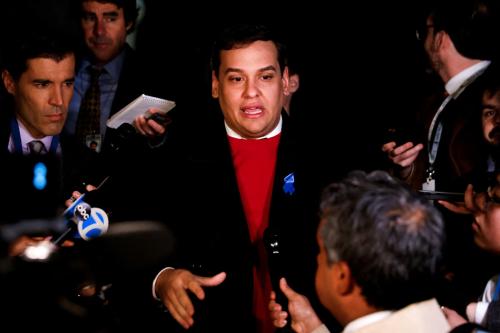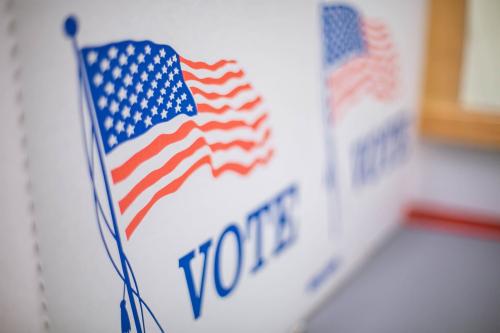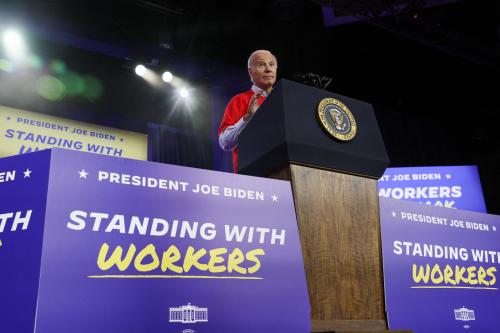This piece is part of “Polling young voters”, a series exploring some of the reasons young voters lack enthusiasm for voting in 2024 through polling analysis.
In the 2016 presidential election, young adults ages 18 to 29 backed Hillary Clinton over Donald Trump by a margin of 30 points, 58% to 28%. Four years later, Joe Biden received 59% of their vote while Donald Trump increased his share to 35% but still lost this cohort by 24 points. These results helped convince many analysts that young adults were becoming a reliable building-block of the Democratic base, and the strong pro-Democratic tilt of young voters in midterm elections fortified this view.
Against this backdrop, it was hard for seasoned observers to believe growing indications that young adult support for President Biden was softening significantly. But the New York Times/Sienna survey of swing state voters burst this bubble of confidence. This poll found that young adults were split evenly (47-46%) between Biden and Trump, while their older siblings ages 30 to 44 favored Trump over Biden by 47% to 43%. A flurry of national surveys soon yielded similar results, making it impossible to dismiss the NYT/Sienna poll as an outlier.
While observers groped for an explanation, it was staring them in the face. When asked whether economic or social issues would be more important in determining their vote in 2024, 62% chose economic issues, the largest share of any age cohort, while only 29% opted for social issues. And these young adults think that the economy is doing terribly. Less than half of one percent said the state of the economy is “excellent;” just 7% said “good” or “very good;” and the remaining 93% said “only fair” or “poor.” Only 38% of young adults believe that Biden’s policies have helped them personally, while 50% think that these policies have hurt them. By contrast, 53% said that Trump’s policies had helped them, compared to 34% who said these policies had hurt them.
It should come as no surprise that only 21% of these young economy voters think that the country is on the right track. Nor should it be surprising that 62% of them trust Trump to do a better job managing the economy, compared to just 34% of them who think that Biden would.
In line with conventional wisdom, young adults do trust Biden over Trump to address social issues such as immigration and abortion, and they think Biden will do a better job with our democratic institutions. But these young voters simply don’t care about these issues nearly as much as they do about the economy.
But this raises a further question: Why are young voters so down on the economy? Isn’t unemployment at near-record lows? Aren’t wages rising while price increases moderate? Isn’t Bidenomics working?
Not from the perspective of young adults. Soaring housing prices have pushed up rents as well, pricing many young adults out of the market, especially in the urban areas they find most desirable. As a result, record numbers of young adults are living at home with their parents. While this arrangement may ensure a steady supply of clean laundry, it’s not what they had in mind when they left high school to enter college or the workforce. The cost of food, not just in restaurants but also in supermarkets, has also soared. Many jobs come without benefits, and young adults lose their eligibility for coverage under their parents’ health insurance before they turn 27.
Young college graduates are especially disappointed. They aren’t getting the across-the-board cancellation of student loans that they had hoped for, and the job market is not meeting their expectations. Because of cutbacks in desirable areas such as tech, finance, and marketing, many college graduates are being forced to accept lower-paying jobs that don’t make use of their skills.
And they are the lucky ones. Many graduates are reporting that they are having a hard time getting interviews and landing full-time jobs. Large numbers are settling for part-time work while continuing the discouraging process of looking for jobs in a softening market. Overall, 4.4% of recent college graduates are unemployed, significantly higher than the rest of the workforce.
The pervasive economic disappointment of young adults occurs in a broader context that includes all households. In 2019, median household income saw its biggest gain in a generation, surging from $73,030 in 2018 to $78,250. In 2020, as the pandemic spread, median household income declined to $76,660. By the end of the second year of the Biden administration, it had fallen further to $74,580. No doubt the recovery has continued in 2023, but it would be a lift to get back to 2020 levels, let alone 2019, which—fairly or not—serves for many voters as a mental baseline against which President Biden’s performance is being measured.
In sum: Like a majority of Americans, young adults care most about the economy, they think it’s in bad shape, and they blame President Biden. This could change between now and the 2024 election, of course. The economy might start performing better for them, the weight they attach to the social issues might increase, or an aggressive negative campaign by the Biden forces could persuade them to alter their view of former President Trump. But if the election were held tomorrow, Biden’s share of young adult votes may well be low enough to cost him the presidency.
The Brookings Institution is committed to quality, independence, and impact.
We are supported by a diverse array of funders. In line with our values and policies, each Brookings publication represents the sole views of its author(s).








Commentary
Back to the future: It’s the economy, stupid
December 4, 2023